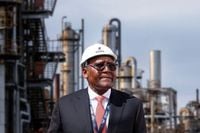Africa's Billionaire Class Sees Unprecedented Growth Amid Economic Shifts
Africa’s billionaire class is witnessing a remarkable surge, with collective wealth soaring to a staggering $105 billion, a significant increase from $82.4 billion just a year ago. This milestone, reported in the latest Forbes listings, highlights not only the growing number of billionaires on the continent but also the unprecedented increases in their fortunes. According to the Forbes report released on March 29, 2025, the number of billionaires in Africa has risen from 20 to 22, indicating a burgeoning class of ultra-wealthy individuals.
At the forefront of this financial boom is Aliko Dangote, who continues to hold the title of Africa’s richest man for the 14th consecutive year. His net worth has skyrocketed from $13.5 billion to $25.7 billion, largely attributed to the success of his newly operational refinery near Lagos. This venture has not only doubled his wealth but has also positioned Nigeria to export refined petroleum products, shifting the country’s long-standing reliance on imports.
“It was a banner year for Africa’s billionaires, whose cumulative wealth surpassed $100 billion for the first time ever,” the Forbes report noted. This surge reflects deeper shifts in key industries and investment flows across the continent. The diversification of wealth sources is evident, with industrialists, financiers, and technology entrepreneurs making notable gains.
Dangote’s refinery has made waves in global energy markets. In March 2025 alone, six vessels shipped 1.7 million barrels of jet fuel to the United States, driving imports to an impressive 226,000 barrels per day. While demand may fluctuate as other refineries, such as New Jersey’s Phillips 66 Bayway, resume operations, this achievement solidifies Dangote’s growing influence in the global fuel trade.
In addition to Dangote, South African luxury goods mogul Johann Rupert has also seen a significant rise in his wealth, retaining his position as one of the continent’s top earners. Rupert, who heads the Compagnie Financiere Richemont luxury line, reported a 39% increase in his net worth, now standing at $14 billion. A January 2025 Bloomberg report revealed that Richemont’s holiday season sales surged by 10%, showcasing strong demand for luxury goods despite challenges in Asia.
Nicky Oppenheimer, the South African diamond magnate, has maintained his third place on the billionaire list, highlighting the enduring strength of Africa’s resource-based industries. Meanwhile, Egyptian billionaires, including Nassef Sawiris, continue to dominate sectors such as construction, finance, and consumer goods, reflecting the regional diversity of Africa’s financial elite.
This year’s Forbes list is notable for the inclusion of Moroccan real estate mogul Anas Sefrioui and South African investment veteran Jannie Mouton. Sefrioui, the founder and CEO of Groupe Addoha, has seen his fortunes rise thanks to government contracts, with the company’s profits more than doubling in 2024. His return to the billionaire ranks follows a previous drop-off in 2018, illustrating the volatility of wealth in the real estate market.
Jannie Mouton, another new entrant to the billionaire club, has built his fortune through South Africa’s PSG Group. His wealth surged following a 59% increase in Capitec Bank Holdings’ stock, one of his key investments. The presence of these new billionaires reflects a shifting landscape in which diverse sectors are beginning to thrive.
Interestingly, the billionaire landscape is not without its challenges. Two notable figures, Nigerian business tycoons Tony Elumelu and Theophilus (TY) Danjuma, were conspicuously absent from this year’s list after experiencing substantial drops in their fortunes due to the depreciation of the Nigerian naira.
Despite the positive trends, the overall picture of wealth creation in Africa remains complex. While the continent’s billionaires are growing richer, the total number of billionaires remains disproportionately low compared to other regions. For instance, the United States boasts 870 billionaires with a combined wealth exceeding $5.5 trillion, while Africa has only 22 billionaires.
Henley & Partners projects that private wealth in Africa will leap 65% over the next decade, reaching $4 trillion, fueled by growth in fintech, eco-tourism, and business process outsourcing. However, the slow pace of wealth creation highlights the continent’s economic challenges, particularly in comparison to Asia and the U.S., which continue to produce new ultra-wealthy individuals at a rapid pace.
In conclusion, while Africa’s billionaires have collectively surpassed the $100 billion mark for the first time, the continent still faces significant hurdles in fostering a broader base of wealth creation. The concentration of wealth among a small group of individuals underscores the need for economic diversification and improved governance to unlock the potential for new entrepreneurs and businesses to thrive.






